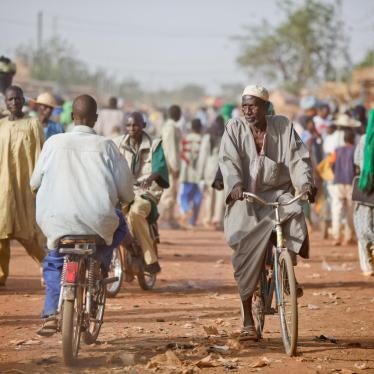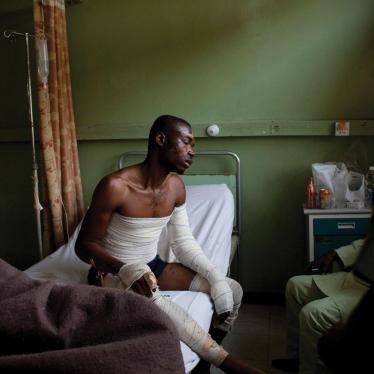(Bamako) – Malian authorities should investigate a spate of alleged summary executions, enforced disappearances, and incommunicado detentions by government security forces, Human Rights Watch said today. The United Nations Security Council, visiting Mali on October 23 and 24, 2021, should press the government to make progress on justice for serious crimes by state security forces and non-state armed groups.
Since September, at least 14 men last seen in the custody of the security forces have “disappeared” or are being held incommunicado, informed sources told Human Rights Watch. The bodies of three men allegedly executed after their arrest by soldiers in early October were found near the army camp in the central Malian town of Sofara, in Mopti region.
“Mali’s transitional government shouldn’t be standing back while its soldiers are linked to a wave of abuses,” said Corinne Dufka, Sahel director at Human Rights Watch. “The UN Security Council should use their visit to reinforce the government’s obligations to respect human rights and investigate and appropriately prosecute abuses by all sides.”
Human Rights Watch spoke by telephone with 22 people with knowledge of the recent allegations including witnesses, family members of the “disappeared,” village leaders, local rights organizations, and foreign diplomats.
Most of the recent abuses occurred during counterterrorism operations in central Mali against Islamist armed groups that in 2021 have been responsible for increasing attacks that have killed scores of security force members and civilians, including a massacre on August 8 of about 50 villagers near Gao.
Others abuses appear to be related to rising political turmoil as a result of Mali’s two military coups in nine months. On August 18, 2020, military officers overthrew the government of President Ibrahim Boubacar Keita and appointed former Colonel Bah Ndaw as interim president; on May 24, 2021, Ndaw was overthrown by his vice-president, Colonel Assimi Goïta, who was sworn in as head of state in June 2021.
Since the resumption of armed conflict in 2012, Malian authorities have failed to ensure justice for dozens of large-scale atrocities implicating ethnic militias and soldiers during counterterrorism operations. There has been some progress on prosecuting grave crimes by armed Islamists.
All parties to Mali’s armed conflict are bound by Common Article 3 of the Geneva Conventions of 1949 and other treaty and customary laws of war, which provide for the humane treatment of captured combatants and civilians in custody. Individuals who commit serious violations of the laws of war with criminal intent, including summary executions and torture, may be prosecuted for war crimes.
“Mali’s authorities should either bring those arrested before a judge and charge them with a credible offense, or release them,” Dufka said. “Those held without charge should immediately be released and the families of those forcibly disappeared should be told where their relatives are.”
Arrests, Enforced Disappearances and Executions around Sofara
Village leaders and witnesses said that from October 2 to 5, security force members arrested at least 34 men in and around the town of Sofara. Two international security analysts told Human Rights Watch the arrests were apparently in response to an uptick in attacks by Islamist armed groups in the area, and specifically, an October 1 attack on Marebougou, 30 kilometers away.
In an October 13 communiqué, the Malian army acknowledged some of the arrests, noting that “22 presumed terrorists” had been transferred to the gendarmerie for investigation. Family members, witnesses, and local community leaders said that at least 11 of the arrested men remain unaccounted for and three men, believed to have been among those arrested, were found dead a few kilometers from the Sofara military camp a few days after their arrest. Community leaders provided Human Rights Watch the names of the 22 men in government custody and 11 men who are missing.
A witness to the arrest of seven men in Sofara on October 2, the majority of whom remain missing, said, “Around 11 a.m., several military vehicles surrounded a small shop near where many families displaced by the war lived. A man working with the army was pointing out who and who to arrest. First, was the shopkeeper, then one by one, others who were drinking tea, walking by, or had come to buy something. The soldiers ripped their clothing to tie their hands and blindfold them, then threw them violently into the vehicles, in which were already 2 others, making 9 arrested in total.”
A trader described the arrests in Sofara on October 5: “It was market day, around 9 a.m. Soldiers flooded the market, some surrounding the animal market, others went into the stalls. It seemed like they were stopping all the [ethnic] Peuhl men – identified by their dress. I didn’t see them asking any questions.” A shopkeeper said, “I heard the soldiers insulting and accusing the men they’d arrested of being terrorists. They took dozens of men. They tied their hands and eyes with the men’s turbans, threw them into the army trucks, then drove off toward their base.”
Two men said they participated in the burial, on October 11, of three of the arrested men whose bodies were found about two kilometers from Sofara. One said, “After hearing about the bodies, we organized a delegation to see for ourselves. After walking for 25 minutes, we found three bodies in the bush, two side by side and the other separated by a few meters. We saw tire tracks near the bodies which were starting to decompose…. We buried them right there.” A cellphone video that circulated on social media appears to show the three bodies described by the witnesses.
Another cellphone video that circulated on social media around the time of the October arrests shows the mistreatment and interrogation (in local Bambara language) of a suspect by four uniformed men. The October 13 government communiqué pledged to investigate the apparent mistreatment, noting that soldiers involved “have been formally identified” and “disciplinary sanctions are already imposed on perpetrators who have been placed at the disposal of the National Gendarmerie for legal proceedings.”
A village elder close to the suspect in the video told Human Rights Watch that the man being mistreated in the video, Hamadoun Diallo, 37, had been arrested by soldiers on October 4 near Tandiama, a village near Sofara, and remains unaccounted for.
Earlier in 2021, Human Rights Watch documented other serious allegations of abuse by the Malian security forces. On March 23, soldiers based in Boni severely beat dozens of bus passengers after finding suspicious material in the baggage compartment. The bodies of at least 13 of the passengers remain unaccounted for and are believed to be buried in a common grave near the Boni military camp. Soldiers from the same military camp executed at least seven other men in March and April, and in January, soldiers killed eight men and forcibly disappeared two others, including a child, near Mali’s border with Burkina Faso.
Enforced Disappearance of Government Officials
Witnesses, human rights investigators, and two diplomats said that at least three former high-level government officials are being held incommunicado after their detention by the security services.
Dr. Kalilou Doumbia, 35, a jurist and advisor to Mali’s top political figures, went missing while en route to a meeting on September 6 at the University of Bamako, where he lectures on legal and political studies. “When he didn’t show for a meeting at the university, we started calling people along the route he would’ve taken to work, to see if they’d seen anything,” a colleague told Human Rights Watch.
On September 10, a police commissioner based in Mali’s Kayes region, Moustapha Diakité, 38, went missing after the director general of police summoned him to Bamako. Two people close to Diakité said he was last seen entering the headquarters of the national intelligence agency, the Directorate of State Security (DSGE). “The summons came from the DG of Police, but once there, Commissioner Diakité was told to report to the DSGE. Once at the DSGE, his phone was confiscated and from that day we have no news as to his whereabouts,” a source close to the family said.
On October 4, in Bamako’s Baco Djikoroni neighborhood, several men in military uniform detained Col. Maj. Kassoum Goïta, 46, the director of state security during President Ndaw’s administration. Said someone close to the family, “At around 2 p.m., they surrounded the house and forced him into a vehicle. Since then, he doesn’t answer his phone. We have looked everywhere.”
Informed sources said they believe the men have been held for intermittent periods within an unauthorized detention facility in Sundiata Keïta military camp, in Bamako’s Kati suburb; within a gendarme camp in Bamako; and within the DSGE. People close to their families said the authorities have refused to acknowledge the men’s presence in these detention facilities and have not allowed their lawyers access to them.
International law defines enforced disappearance as the detention of a person by state officials or their agents and a refusal to acknowledge the detention or to reveal the person’s fate or whereabouts.
Under both transitional governments in Mali there have been several high-profile cases characterized by violations of due process, including prolonged detention of suspects without charge and denial of access to lawyers and family members.
|
News Release
Mali: Alleged ‘Disappearances,’ Executions by Security Forces
UN Security Council Should Urge Investigations of Abuses by All Sides
Correction
We have corrected the online version of this release to indicate that the UN visiting mission to Mali will be from October 23rd to 24th, 2021.
Your tax deductible gift can help stop human rights violations and save lives around the world.
Most Viewed
-

-
April 27, 2021
A Threshold Crossed

-
February 20, 2026
Abuses in Cameroon After US Deports Third-Country Nationals

-
November 25, 2019
A Dirty Investment

-
January 23, 2018
Hidden Chains




